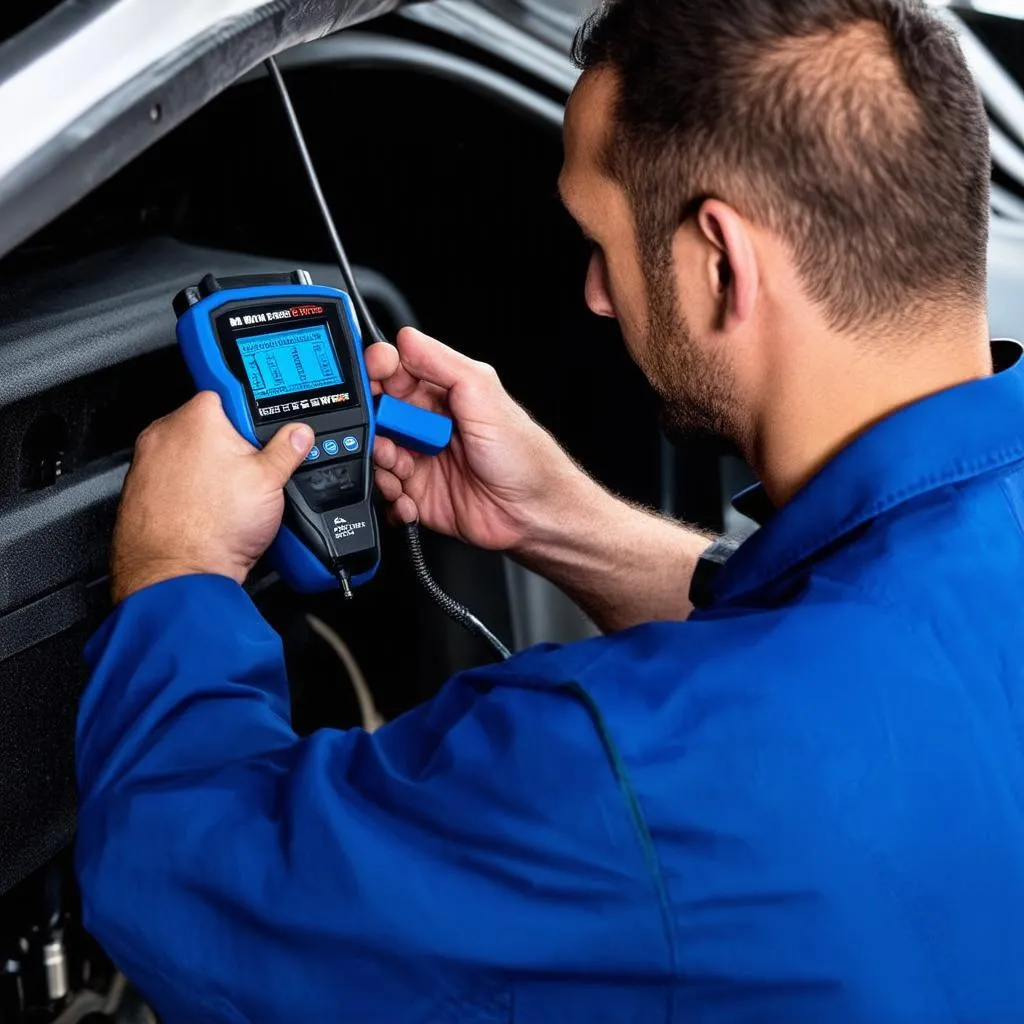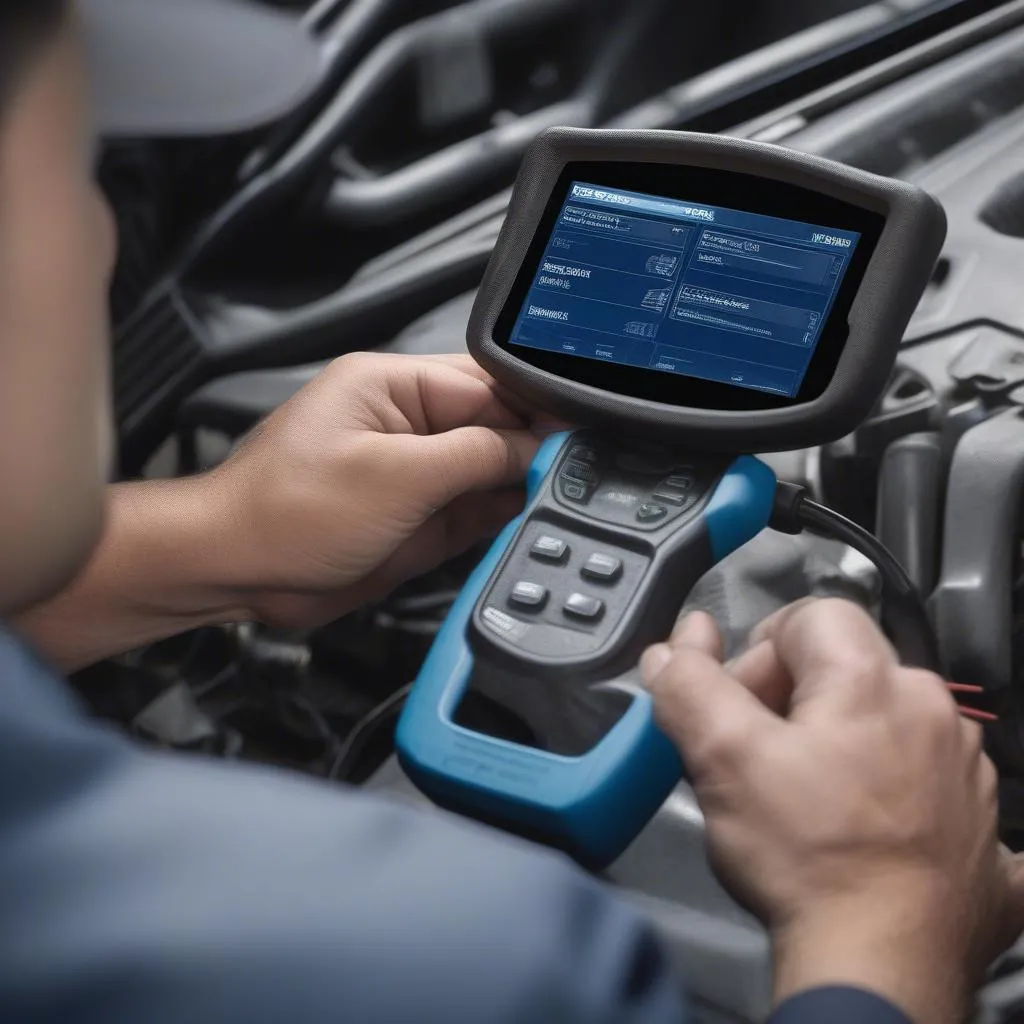Imagine this: you’re driving down the scenic Pacific Coast Highway, California, the sun dipping below the horizon, and suddenly your car starts sputtering. You pull over, heart sinking as you realize your trusty “Check Engine” light is glaring back at you. A wave of questions floods your mind: What’s wrong? How serious is it? Can a simple scan tool tell me, or am I headed for a mechanic’s nightmare?
This scenario highlights a common question car owners have: can a scan tool actually diagnose a bad actuator? Let’s dive into the world of automotive diagnostics and unravel this mystery.
Understanding the Question
Before we jump into the answer, it’s essential to define our terms from various perspectives:
From a Mechanic’s Perspective: A mechanic sees a “bad actuator” as a physical component failure. They want to know if the scan tool can pinpoint the exact culprit – be it a faulty throttle actuator, a malfunctioning EGR valve, or a problematic ABS module.
From an Automotive Engineer’s Perspective: An engineer dives deeper into the technicalities. They want to know if the scan tool can accurately interpret the Diagnostic Trouble Codes (DTCs) related to actuator performance and identify any deviations from factory specifications.
From a Car Owner’s Perspective (and likely yours!): You just want to know if the scan tool can save you time, money, and a potential headache. Will it give you enough information to decide whether to tackle a DIY fix or head straight to a professional?
The Answer: It’s Complicated
The truth is, a scan tool can be a powerful ally in diagnosing a bad actuator, but it’s not a foolproof solution. Here’s why:
Scan tools excel at:
- Reading Diagnostic Trouble Codes (DTCs): These codes act like your car’s internal alarm system, signaling when something isn’t right.
- Monitoring Live Data: Scan tools display real-time information from various sensors, allowing you to observe how the actuator responds to commands.
- Performing Actuator Tests: Some advanced scan tools can even command specific actuators to operate, helping you pinpoint if they’re functioning correctly.
However, scan tools have limitations:
- Correlation is Key: A DTC alone doesn’t guarantee a bad actuator. For example, a code related to low fuel pressure could stem from a faulty fuel pump, a clogged fuel filter, or even a wiring issue – not necessarily a bad fuel pressure actuator.
- Mechanical vs. Electrical: While scan tools excel at electrical diagnostics, they can’t always detect underlying mechanical problems within an actuator itself.
- The Human Factor: Interpreting scan tool data requires experience and knowledge. Just like a doctor needs to analyze medical test results, a mechanic uses their expertise to diagnose the issue accurately.
Case Study: The Case of the Stubborn Throttle Body
Imagine your car suddenly loses power while driving on Interstate 95, causing a minor traffic jam (we’ve all been there!). You pull over, whip out your trusty scan tool, and find a DTC related to the throttle position sensor.
Now, this could point to a faulty sensor within the throttle body, requiring replacement. However, a seasoned mechanic using a scan tool’s live data might discover that the throttle plate is sticking due to carbon buildup, a simple cleaning fix.
 Car Engine
Car Engine
So, What Does This Mean for You?
Think of a scan tool as a powerful flashlight in a dark room. It illuminates the potential problem areas, but you still need the knowledge and experience to identify the root cause.
Here’s how to make the most of a scan tool:
- Choose the Right Tool: Invest in a quality scan tool compatible with your car’s make and model.
- Understand the Basics: Familiarize yourself with basic automotive terminology and how to interpret DTCs.
- Don’t Jump to Conclusions: A DTC is just a starting point. Use the scan tool’s live data and actuator test functions to gather more information.
- Consult a Professional: If you’re unsure about the diagnosis or repair, don’t hesitate to seek help from a qualified mechanic.
Frequently Asked Questions
Can a scan tool diagnose a bad ABS actuator?
Yes, a scan tool can help diagnose a bad ABS actuator by reading DTCs related to the ABS system, such as wheel speed sensor errors or communication faults with the ABS module. Some scan tools can also perform actuator tests, commanding the ABS module to engage and disengage the brakes to check for proper operation.
Can a scan tool diagnose a bad EVAP actuator?
Absolutely. A scan tool can pinpoint EVAP system issues, including a malfunctioning EVAP vent solenoid or purge valve. It can read DTCs, monitor purge flow, and even command the EVAP system to test for leaks.
Can a scan tool diagnose a bad actuator on a Volkswagen?
Yes, but you’ll need a scan tool specifically designed for Volkswagen and Audi vehicles, ideally one capable of accessing their proprietary protocols.
Can any OBD2 scanner diagnose a bad actuator?
While a basic OBD2 scanner can read generic DTCs, it may not offer the advanced functionalities needed for comprehensive actuator diagnostics. For in-depth analysis and actuator testing, consider a professional-grade scan tool.
 Mechanic with Scan Tool
Mechanic with Scan Tool
Explore Further
- 5 Signs Your Car Needs a Throttle Body Cleaning
- Understanding Diagnostic Trouble Codes: A Beginner’s Guide
- Common ABS Problems and How to Fix Them
Need Help with Your Car Diagnostics?
We understand that car trouble can be stressful. If you’re facing a diagnostic dilemma or need assistance interpreting scan tool data, don’t hesitate to reach out to our team of automotive experts via WhatsApp at +84767531508. We’re here to help you get back on the road safely and confidently!
Remember, knowledge is power when it comes to car maintenance. By understanding the capabilities and limitations of your scan tool, you can become a more informed car owner and avoid unnecessary headaches down the road.


